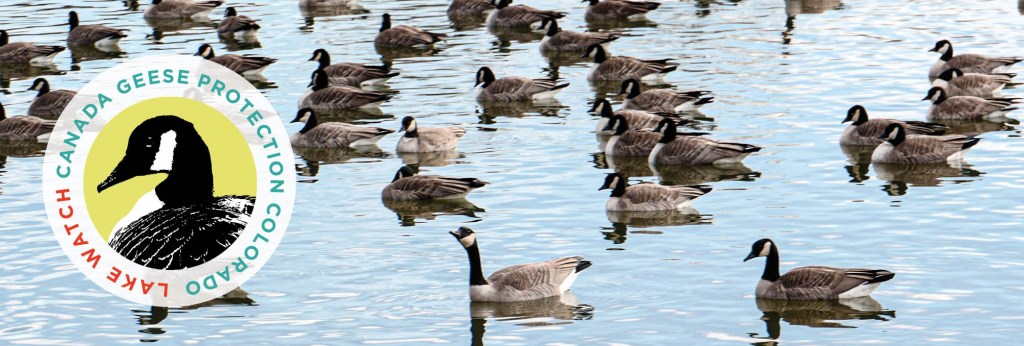

Lake Watch is a grass-roots “citizen science” effort organized through Canada Geese Protection Colorado to help improve the scientific understanding of Denver area urban lakes and ponds as wildlife habitat. Citizen science is a way for the public to participate in scientific research in order to increase the public’s understanding of the natural world. We encourage adults, children, amateurs, professionals, students, policy-makers, and anyone interested in enjoying nature and parks to join the effort to observe, understand, and advocate for the welfare of lake-related urban wildlife.
Much as human population activity may appear scattershot at first glance to a visitor from another world, a careful observation would show patterns of selection; we visit parks and museums, stores, coffee shops, venues, homes, schools, houses of worship, and more– and we do so at different times and in different configurations. In much the same way, understanding –and more importantly, quantifying– patterns of habit and numbers of geese over the course of time will allow us to make well-founded estimations of what landscape features affect their decisions, and to what extent.
We say “geese are everywhere!”; but while geese are common, they must make the same types of considerations we do to utilize or “pass” on a given spot that is objectively acceptable. You might might take side roads to work if the freeway is too backed up on a Monday, but be perfectly happy driving that same freeway to a friend’s house on the weekend. You made a decision based on congestion in the moment, not on the theoretical speed limit or the “design capacity” the road engineer had in mind decades ago. All such decisions are based on several variables– for purposes of Lake Watch we want to identify the combinations of motivation, ease or cost of access, and congestion that result in some sites being “over run” by geese while other seemingly acceptable sites are under-utilized or ignored.
The goal is not to ‘wild’ the parks, but to better understand the how & why of site selection, particularly in geese. In addition, we expect this project will broaden the common perception of parks as strictly human playgrounds to one that understands urban parks & lakes as human-centered ecosystems which also support the wide variety of wild plants and wildlife beyond the geese that are so often the focus of our attention.
Objectives
- Monitor lake-based park ecosystems year-round, with a particular focus on Canada Goose populations. For geese specifically, this means we monitor the healthy, the injured, nests, family groups, and seasonal & land-use patterns.
- Implement an easy to learn counting and recording protocol that will produce scientifically useful data.
- Offer resources to train non-specialists in identifying and recording various wildlife species and ecosystem indicators.
- Increase awareness of the lake ecology of which the Canada Geese are a part through education, volunteering, and advocacy.
- Seek to identify landscape specifics that may underlie site-selection by geese; eg, landscaping, structures, tree cover, predators and simulated predation, etc.
What will you be doing if you participate in Lake Watch?
- Choose one (or more) of the designated parks or sections of parks, visit it regularly, and
- Take a few pictures and fill out the 1-page worksheet/questionnaire.
– The questions touch on variables that change frequently in the lake/park ecosystem– numbers & location of geese, human activities, other species present, weather. (You will not be expected to count non-goose species, only note presence) - Chart numbers and locations of geese on the map
- We expect a worksheet will take 15-30 minutes to complete, depending on the park and numbers/flocks present. (Large parks may take up to an hour).
- Take a picture or scan each completed worksheet and email it to us!
You can download the PDF below for your preferred park, visit the park, fill it out, and send it back to us!
We will host a few Zoom info/training sessions in coming weeks, please email us to be included.
And of course, you may contact us any time with questions. Recordings of informational sessions plus additional informational videos will be generally available as they are produced.
Over time this effort, made by you and other members of the community, will result in scientifically significant data about the geese and their movements. This will help inform future management requests the city receives regarding geese as well as private landowners who struggle with the issue (eg. business parks, golf courses).
Time Commitment
The amount of time required to participate in this project depends upon you. At a minimum we ask that you visit one park within the study once a week around the same time of day. We would expect that you would need to spend at least around 30 minutes to an hour within the park collecting data and observing.
Interested?
Contact us! Contact Kenyon Moon or Kelly Leviker at our Lake Watch email, cgpc.lakewatch@gmail.com. We look forward to your participation!
Download Lake Watch Worksheets here:
